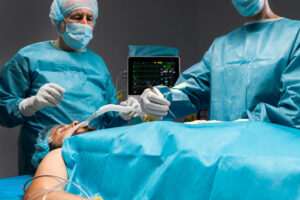In the US, 250,000 cases of appendicitis are reported annually. However, the incidences of the problem are lower in Asian and African countries. One reason can be the dietary habits of these populations that include higher consumption of high-fiber foods.
Appendicitis is one of the most common yet important emergency abdominal surgeries in the world. It can affect anyone irrespective of their age, gender and nationality. However, appendicitis is rare in infants below 2 years of age. It is most common between the ages of 10 and 30.
THE FIRST SIGN OF APPENDICITIS
Appendix is a tubular structure located near the right hip bone, in the lower abdominal region. The average length of the appendix is 9 centimeters although it varies from person to person. Often called the vestigial organ, experts are still debating its importance in the human body.
Appendicitis causes acute pain in the appendix due to blockage on account of infection, stool, foreign body or even cancer. If you are feeling a dull pain in the upper abdomen or the navel region and it becomes sharp as you move towards the lower abdomen, it can be the first sign of appendicitis.
Other symptoms of the disease include:
- Loss of Appetite
- Nausea and Vomiting
- Swelling and Cramps in the Abdominal Region
- Constipation, Diarrhea, Gas
- Painful Urination
- Fever
No specific diagnostic test exists for appendicitis, but your doctor will conduct the following tests in order to check for infections and confirm the clinical diagnoses.
- Abdominal Test
- Urine test
- Rectal Exam
- Blood test
- Ultrasound
- CT Scans
APPENDECTOMY: A COMMON SURGICAL PROCEDURE TO TREAT APPENDICITIS
Usually, the most common treatment for appendicitis is the surgical removal of the organ, called appendectomy. If your doctor diagnoses your condition as appendicitis, he will remove the appendix to avoid rupture and further complications. However, surgery is not the only solution. In certain situations, the doctor can suggest antibiotics instead of surgery. If there is a visibility of abscess, the GI doctor will have to drain the pus pocket and conduct another surgery to remove it.
Laparoscopic surgeries have multiple benefits such as more precision, reduced pain, decreased chances of infection, etc. If your doctor conducts an appendectomy with a laparoscopic instrument, it is known to reduce recovery time and post-op care. So, make sure you discuss it with your doctor in advance.
WHY DO YOU NEED TO CONSULT A GASTROINTESTINAL SURGEON IMMEDIATELY?
It is essential that you avoid using any homemade pain remedies to alleviate the symptoms. Instead, consult a gastrointestinal surgeon immediately. If you opt for antacids or laxatives to subside the pain, it can cause the appendix to rupture and infectious materials can spill into the abdominal region. If appendicitis is not treated quickly and accurately, it can prove to be fatal.
Appendix removal surgery requires more experience and use of special equipment. As a result, the success of the surgery depends on the operating surgeon and the facilities available to him. You must make sure you consult an experienced gastrointestinal surgeon. Also, you will need an expert surgeon to take care of any postoperative problems such as vomiting, dizziness, fever, diarrhea or blood in urine, vomit and stool. This is because there might be underlying issues such as UTIs, Gastroenteritis, Crohn’s disease or Colorectal Cancer.
Are you suffering from acute appendicitis? Visit the reputed gastrointestinal surgeon of Surat to treat the issue. Consult an experienced gastro surgeon who will ensure immediate medical attention and care to treat the disease.





